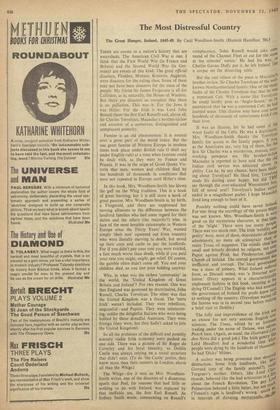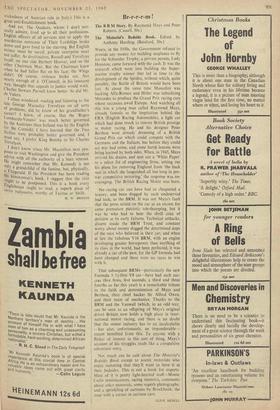The Most Distressful Country
The Great Hunger, Ireland, 1845-49. By Cecil Woodham-Smith. (Hamish Hamilton. 30s.)
THERE are events in a nation's history that are watersheds. The American Civil War is one. I think that the First World War (in France and Britain) and the Second World War (in Ger- many) are events of this kind. The great official disasters, Flodden, Mohacs, Kossovo, Aughrim, were disasters for the ruling class. Some of them may not have been disasters for the mass of the people. My friend Sir James Fergusson is all for Culloden, as is, naturally, the House of Windsor. But there are disasters so complete that there is no palliation. This was it. For the Jews it was Hitler. For the Irish it was Lord John Russell (later the first Earl Russell) and, above all, Sir Charles Trevelyan, Macaulay's brother-in-law and ancestor of a numerous, distinguished and complacent posterity.
Famine is an old phenomenon. It is normal over a great part of the world today. But the one great famine of Western Europe in modern times took place under British rule (I shall say under English rule) at a time when famines could be dealt with, as they were by France and Prussia. It was in the reign of Good Queen Vic- toria that men, women and children died by the hundreds of thousands in conditions that were not repeated in Europe until Hitler's time.
In this book, Mrs. Woodham-Smith has blown the gaff on the Whig tradition. This is a book of great learning, but it is still more a book of great passion. Mrs. Woodham-Smith is, by birth, a Fitzgerald, and there are suppressed but moving allusions to the difference between the landlord families who had some regard for their duties and the others (the majority?) who, in face of the most horrible catastrophe in Western Europe since the Thirty Years' War, wanted simply 'their rent' squeezed out from tenantry who were literally starving to death, but saved up their corn and cattle to pay the landlords. For if you didn't pay your rent you were evicted, a fate much worse than death, while if you paid your rent you might, might, get relief. Of course, the gamble often didn't come off. You and your children died, so you lost your holding anyway.
Why, in what was the richest 'community' in the world, the 'United Kingdom of Great Britain and Ireland'? For two reasons, One was that England was governed by doctrinaires, John Russell, Charles Trevelyan. The other was that the United Kingdom was a fraud. The 'mere Irish' weren't included. They were rebellious,
ungrateful—and Papists. They were uninterest- ing, unlike the delightful Italians who were being bullied by those dreadful Austrians. They were foreign (they were, but they hadn't asked to join the United Kingdom).
So all the problems of the difficult and possibly scarcely viable Irish economy were pushed on one side. There was a picture of Sir Roger de Coverley and his loyal tenantry, so Dublin Castle was always relying on a social structure that didn't exist. (To do 'the Castle' justice, they knew more than their masters in London, above all than the Whigs.) The Whigs—for it was, as Mrs. Woodham- Smith writes, one of the disasters of a disastrous epoch that Peel, for reasons that had little or nothing to do with Ireland, was replaced by that ineffable ass, the first Earl Russell. As Sydney Smith wrote, commenting on Russell's
complacency, 'John Russell would take cony nand of the Channel Fleet or cut for the stone at ten minutes' notice.' He had his way: as Charles Gavan Duffy put it, he left Ireland like a corpse on the dissecting table: But the real villain of the piece is NlacaulaY's brother-in-law, Sir Charles Trevelyan of the well- known Northumberland family. One of the many faults of Sir Charles Trevelyan was that he was a repentant Celt. With a name like Trevelyan, he could hardly pass as 'Anglo-Saxon,' so he announced that ha was a converted Celt; he had learned sense. This illusion may have cost some hundreds of thousands of unfortunate Irish Celts their lives.
It was an illusion, for he had some of the worst faults of the Celts. He was a doctrinaire, Mrs. Woodham-Smith thanks the TrevelYan family for access to the family papers. It was' as the Americans say, very big of them, for the first Sir Charles was a murderous, zealous, over working pompous ass. His brother-ja-laW, Macaulay is reported to have said that the old Indian civil service was educated above its ability. Can he, by any chance, have been think' ing about Trevelyan? He liked him; TrevelPati
made his darling sister happy, but did TB' see through the over-educated Westminster 130Y, full of moral zeal? Trevelyan's Indian career ended in a magnificent purler. I hope Macaulay lived long enough to hear of it.
Possibly nothing could have saved Ireland: For one thing the mycology of the potato blight was not known. Mrs. Woodham-Smith is very good on the mysterious character, at that titre, of the 'blight.' There were too many Pe°Pleci There was too much rent. The Irish 'nobility and gentry' were, most of them, descendants of cheap adventurers, no more an aristocracy than sus many Texas oil magnates. The middle class. vialy small and bitterly divided by religion, not (31;4 Papist against Prod, but Presbyterian aga!"as ChtIrch of Ireland. The central government wag inefficient and corrupt. The local government was a mass of jobbery. What Ireland suffereo, from, as Disraeli noted, was 'a thwarted rey„„ lution.' (Dizzy appears in a characteristically unpleasant fashion in this book, sneering at the dying dying O'Connell.) The English who had assumed the government of Ireland for profit knew ne,ig to nothing of the country. (Trevelyan waited king the famine was in its second year before ma k
a brief visit to Dublin.)
A society was being protected that dese.irvesd, destruction. Some Irish landlords, like lvtan Gerrard (any of the family around?), rec•
Turgenev's mother. Others, like Lord Clan
gifil ricarde, behaved like the bad aristocrats in a ro about the French Revolution. The gay Ifcb, Palmerston behaved a little better, but not 11' ('Tenant's right is landlord's wrong,' clucIltj in intervals of dictating memoranda 0A' The folly and improvidence of the Irish wa35, an excuse for not very anxious English c% sciences. The Times, edited by an Irishin.as, trading under the name of Delane, was odte_uti, Punch base. (Again, as usual, the Illustrated 1.;ce don News did a good job.) The Irish gentry 1,1,4 Lord Headfort had a wonderful time
people were dying by the hundreds of thousand5" So had 'Dicky' Milnes. wickedness of Austrian rule in Italy.) This is a great anti-Establishment book.
And yet. The Quakers, whom I don't nor- mally admire, lived up to all their professions. English officers of all services sent to apply the murderous nonsense of Their Lordships broke down and gave food to the starving. But English money must be saved; private enterprise must not suffer. As doctrinaires, Russell and Trevelyan recall, on one side Herbert Hoover, and on the other Chairman Mao. But the Chairman knew When he had fallen flat on his face; the Whigs didn't. Of course, violence broke out. Not nearly enough of it. O'Connell, in his innocent Way, thought that appeals to justice would work. Charles Stewart Parnell knew better. So did Mr.
de Valera.
often wondered, reading and listening to the late George Macaulay Trevelyan on all sorts of problems, did he know of his grandfather's career? I knew, of course, that the 'Remo Lombardo-Veneto' was much better governed by the Austrians than Ireland was by the English (or the Cornish). I have learned that the Two Sicilies were probably better governed and, I must say, I prefer King Bomba to Sir Charles
Trevelyan.
I don't know when Mr. Macmillan next pro- poses to visit Washington and give the President advice with all the authority of a Suez veteran. He might remember that Mr. Kennedy is not Only a grandchild of the famine, but, physically, a Fitzgerald. If the President has been reading his kinswoman's book, I suggest that the visit ought to be postponed. This is a book every Englishman ought to read, a superb piece of saeva indignatio, worthy of Tacitus or Swift.
D. W. BROGAN











































































 Previous page
Previous page